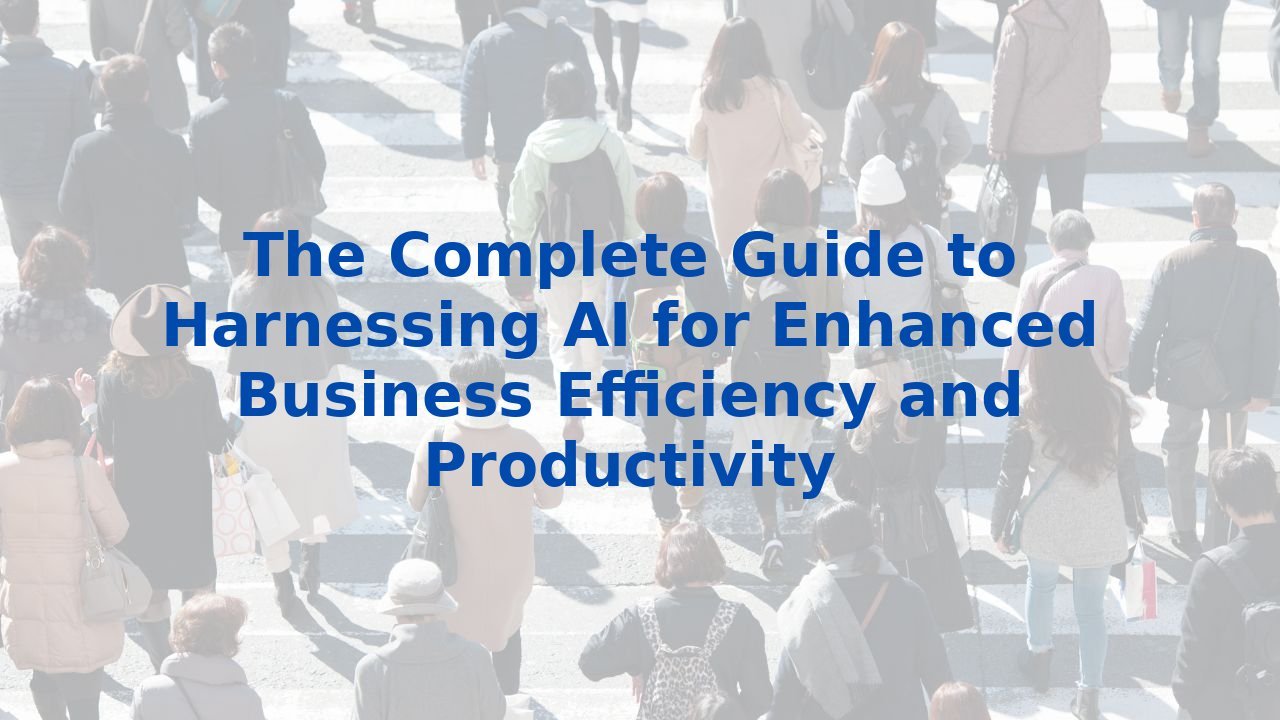The Complete Guide to Harnessing AI for Enhanced Business Efficiency and Productivity

The Complete Guide to Harnessing AI for Enhanced Business Efficiency and Productivity
Introduction
In today's fast-paced business landscape, organizations are continually seeking ways to enhance efficiency and productivity. Enter Artificial Intelligence (AI)—a transformative force that is reshaping business processes. This guide delves into how AI can empower companies to unlock their potential, streamline operations, and create a robust foundation for future growth.
Understanding AI in Business
AI is far more than just a trendy term; it represents a culmination of cutting-edge technologies that enable machines to mimic human intelligence. From machine learning to natural language processing, AI can automate tasks, analyze data, and extract insights at an unparalleled speed. Its applications in business are wide-ranging and extremely impactful, paving the way for smarter operations.
Enhancing Business Processes with AI
1. Data Analysis and Insights
One of the most potent capabilities of AI lies in its ability to process vast datasets rapidly. This allows organizations to uncover patterns and trends that would be virtually impossible to identify through manual analysis. Specifically, within customer experience (CX) and employee experience (EX) teams, AI-driven insights can drastically reduce the time to insight, empowering teams to make quicker, smarter decisions.
2. Automation of Repetitive Tasks
AI shines in its ability to automate repetitive and mundane tasks such as data entry, scheduling, and basic customer inquiries. By taking over these labor-intensive responsibilities, AI helps free up valuable human resources, allowing employees to focus on creative and strategic tasks that drive innovation and organizational growth.
3. Personalization and Customer Experience
With the power of natural language processing, AI can analyze customer interactions with unparalleled precision. This analysis allows businesses to tailor their service offerings to meet specific customer needs, thus enhancing customer satisfaction. The result? A personalized customer experience that builds loyalty and drives long-term relationships.
4. Predictive Analytics
AI's predictive capabilities are revolutionary. By examining historical data, AI models can forecast future trends and outcomes. This kind of predictive insight is essential for businesses in industries like marketing, finance, and supply chain management, enabling them to make informed decisions and proactively mitigate risks.
The Benefits of AI for Organizational Efficiency
1. Increased Productivity
Automation and smart data analysis equate to significant productivity boosts across the organization. By streamlining operations and minimizing the time spent on routine tasks, businesses can achieve more with fewer resources, translating into substantial cost savings and improved outputs.
2. Improved Decision-Making
AI equips organizations with a data-driven approach to decision-making. With access to timely and relevant insights, teams can move away from intuition-based choices. The result is a more strategic and effective decision-making process that leverages real-time data.
3. Enhanced Customer Experience
Beyond just personalization, AI-driven enhancements foster a deeper understanding of customer needs and preferences. Tailored interactions not only satisfy current clients but also drive new customer acquisition through positive word-of-mouth and brand loyalty.
The Importance of Employee Training for AI
Harnessing AI's full potential requires more than just implementing the technology; it necessitates a paradigm shift in how employees interact with these tools. Here are key reasons why training is paramount:
1. Maximizing Value from AI Tools
Targeted training on AI tools and applications ensures employees are well-equipped to utilize these resources effectively. This knowledge allows them to extract valuable insights and integrate those insights seamlessly into their workflows, ultimately enhancing operational effectiveness.
2. Addressing Ethical and Bias Concerns
AI systems rely heavily on data quality. By emphasizing the importance of ethical data management and inclusivity in AI training, organizations can mitigate bias and uphold strong ethical standards in their AI practices.
3. Encouraging Creativity and Innovation
AI isn't just about efficiency; it also serves as a catalyst for creativity. When employees are trained to collaborate with AI, they can explore new, innovative solutions that challenge the status quo, leading to breakthrough products and services.
Conclusion
The integration of AI into business operations signifies a new era of efficiency and productivity. Understanding how AI can enhance core business processes, combined with a commitment to employee training, positions organizations to thrive in a rapidly evolving landscape. As AI technology grows in sophistication, the businesses that embrace these changes will cultivate the strategies necessary for sustained success in the future.
"For businesses ready to embrace the AI revolution, the journey is just beginning. With the right mindset and training, the possibilities are immense."